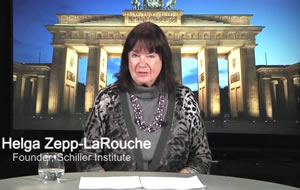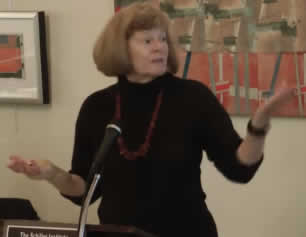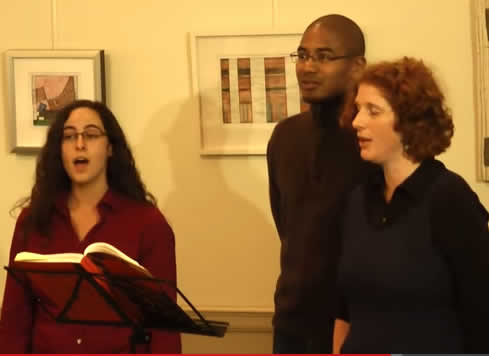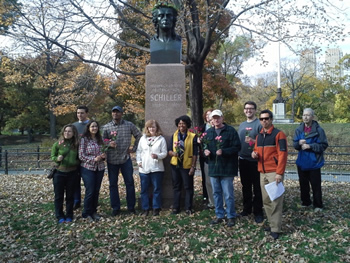The Pathway to Freedom is Through Beauty: Threefold Celebration in New York City
by Dennis Speed
November 2014
Videos of the Celebration
Speech by Helga Zepp-LaRouche (Video and Transcript)
Speech by Ramsey Clark (Transcript)
Tribute to Schiller, Poet of Freedom
The N.Y.-N.J. chapter of the Schiller Institute held an extraordinary celebration on Saturday, November 8th, commemorating the three-fold occasion of the 25th anniversary of the fall of the Berlin Wall, 255th birthday of the "Poet of Freedom" Friedrich Schiller, and the 30th anniversary year of the Schiller Institute. That 25th anniversary--largely uncelebrated and barely mentioned by the Obama White House--was also the year of the birth of "the World Land Bridge", a physical economic policy created by Lyndon LaRouche, then a United States political prisoner, in response to the great opportunity provided to humanity by the Berlin Wall's fall.
 |
The Great Hall of the First Presbyterian Church in the East Village of NYC's Manhattan hosted 150 people. The event centered around three presentations, bracketed by music. Those presentations were given by Helga Zepp-LaRouche via video, Leni Rubinstein of the New York/New Jersey Schiller Institute, and former US Attorney General Ramsey Clark.
The event was begun with the polyphonic singing of the three verses of the 200-year-old "Star-Spangled Banner" by the New York/New Jersey Schiller Institute Chorus. This was immediately followed by a masterful performance of the Adagio and Fugue from Bach's Violin Sonata in G Minor (BWV1001) by 16-year old Yaegy Park. A real, spontaneous standing ovation greeted her setting of the high poetic-emotional tone that was maintained throughout the event. The core presentations followed, each one of which built on that which had immediately preceded it.
Helga Zepp-LaRouche's video message, (video and transcript here), concluded: "So therefore, reflecting on the 25-year anniversary of the Fall of the Wall, when the system came to its end, we are now in a similar situation. The free-market economy is about to blow up completely. We are at an absolutely crucial transition of world history, and we absolutely must not again miss the great chance."
 Leni Rubinstein |
The World Land-Bridge. |
Leni Rubinstein's presentation concentrated upon the principled unity of the idea of 1989 with Schiller's great idea of 1785: his poem "Ode To Joy". "Beethoven worked for decades--he had the idea of Schiller's poem--"Freude, schoner Gotterfunken,--"Joy, beautiful , godly sparks". Beethoven came back to this again and again throughout his life, until he found that he could make a whole symphony, and build up through the first movements to the last phase, where human voices come in, in a celebration of mankind. This is what Schiller represents, and this is what our Institute represents--the whole Ninth Symphony, but (particularly) this celebration of mankind in the very end. And if you think about the Ninth Symphony, you think about the World Land-Bridge: "seid umschlungen, Millionen!"--"embrace, ye millions of mankind": "allen Menschen werden bruder"--"all people will become like brothers", because we are one humankind--this is what this map represents. Rubinstein continued: "Helga talked about the world Land Bridge as a universal image of mankind. And if you look at this globe of ours, this is our garden, which is completely inhabited by mankind collaborating with each other around mutual development principles. This is an image of an anti-imperial, anti-oligarchical world. And for the first time, in the history of mankind--I'm not exaggerating--for the first time in the history of mankind, we have the possibility for making this reality, that this becomes the new era of mankind, where we also as human beings will also (have) become different."
Ramsey Clark's impromptu remarks to the assembled audience immediately followed the conclusion of Rubinstein's presentation, the which featured two musical compositions by Johannes Brahms, re-creating two musical settings for two Friedrich Schiller poems, the second of the which was performed live: "Dem dunkeln Schoß der Heilgen Erde" (from Schiller's poem "The song of the Bell"), and the "Nänie", performed by the Schiller Institute Chorus under the direction of conductor John Sigerson. Clark captured the spirit of the aspirations for freedom, expressed in the demonstrations of 1989, but warned the audience that the drum beat for general global war, using the most vicious weapons of mass destruction, threatens to overtake all of humanity; the entire human race can be destroyed in the madness of conflict. Clark however, insisted, not only is his view optimistic, but music was the essential weapon to be now wielded in defense of humanity. "I'd rather not be taken seriously than refuse to believe we shall overcome...we can overcome but we are in a race between education and catastrophe, and catastrophe is closing in. And on that optimistic and happy note, I say: let's sing our way to peace."
Ending the first half of the program were presentations by Lynn Yen, founder and executive director of the Foundation for the Revival of Classical Culture (FFROCC), who described the progress of the foundation over the past 3 years and the foundation's taking up of the mission, in the last year, to restore the proper tuning pitch of A=432 HZ. A graduate of the Foundation's summer program, 19 year-old baritone Carlos Arcos Marwyn, had near the beginning of the event performed the Italian art-songs "O del mio amato ben" and "Caro mio ben" in tandem with 84-year old baritone and music teacher Harry Thompson, who sang selections from Handel's Messiah, Mendelssohn's Elijah, and the African-American Spiritual, "Honor, Honor" as arranged by composer Hall Johnson. Several audience members remarked at how thoughtfully moved they were to see and hear the two singers in succession. "It caused me to realize how timeless and permanent great music can be," said one person.
Following Lynn Yen, 16-year-old Jose Vegas, a youth member of the Foundation's Music and science summer program, made some remarks. Vegas had attended classes taught by several teachers, including members of the LaRouche basement science team. Jose gave a passionate presentation on real education vs. ramming facts into students. He reported his experiments in teaching his peers elements of Plato's Meno dialogue, complete with pedagogical folding squares. He also referenced the importance stressed in his summer studies of 17th century scientist-philosopher Johannes Kepler.
Jose and other FFTROCC students have been taking their ideas and geometric constructions out on to the streets of New York City in recent weeks and educating passersby. During the intermission/ dinner break, which followed, many attendees visited their "pedagogical displays", which featured their "home-made constructions", including the five Platonic solids and their various "stellations", all of which had been constructed by the youth.
 Left to right: Michelle Fuchs, Frank Mathis and Jessica Tremblay sing "Soave sia il vento" from the Mozart opera Cosi fan tutte.
|
Schiller Institute members host a tribute to the poet at the statue of Friedrich Schiller in Central Park. |
The second section, much shorter than the first, was particularly notable for a dramatic reading of the Edgar Poe story "The Masque of the Red Death" by actor Dikran Tulaine, and for the performance of three musical selections: "I Remember the Wondrous Moment," written by Mikhail Glinka and Alexander Pushkin, and performed by baritone Frank Mathis in honor of Russia's great contribution throughout history to creating and preserving the United States republic; "Soave sia il vento" from the Mozart opera Cosi fan tutte, performed by the trio of Michell Fuchs, soprano, Jessica Tremblay, alto, and Frank Mathis bass; and Beethoven's famous quartet from the opera Fidelio, "Mir ist so wunderbar, featuring Michelle Fuchs, Jessica Tremblay, Frank Mathis and tenor Scott Mooney. Greetings to the conference from various international and national quarters were also read.
The following day, Sunday, November 9 – the exact 25th anniversary of the fall of the Wall – Schiller institute members hosted a tribute to the poet at the Schiller and Beethoven statues. These are located in New York City's Central Park. The Schiller statue was the first to be placed in Central Park in 1859, on the occasion of the 100th birthday of the poet. There was music, a brief presentation, and the placing of a garland on the Schiller statue.
Videos of the Celebration



